Publications
-
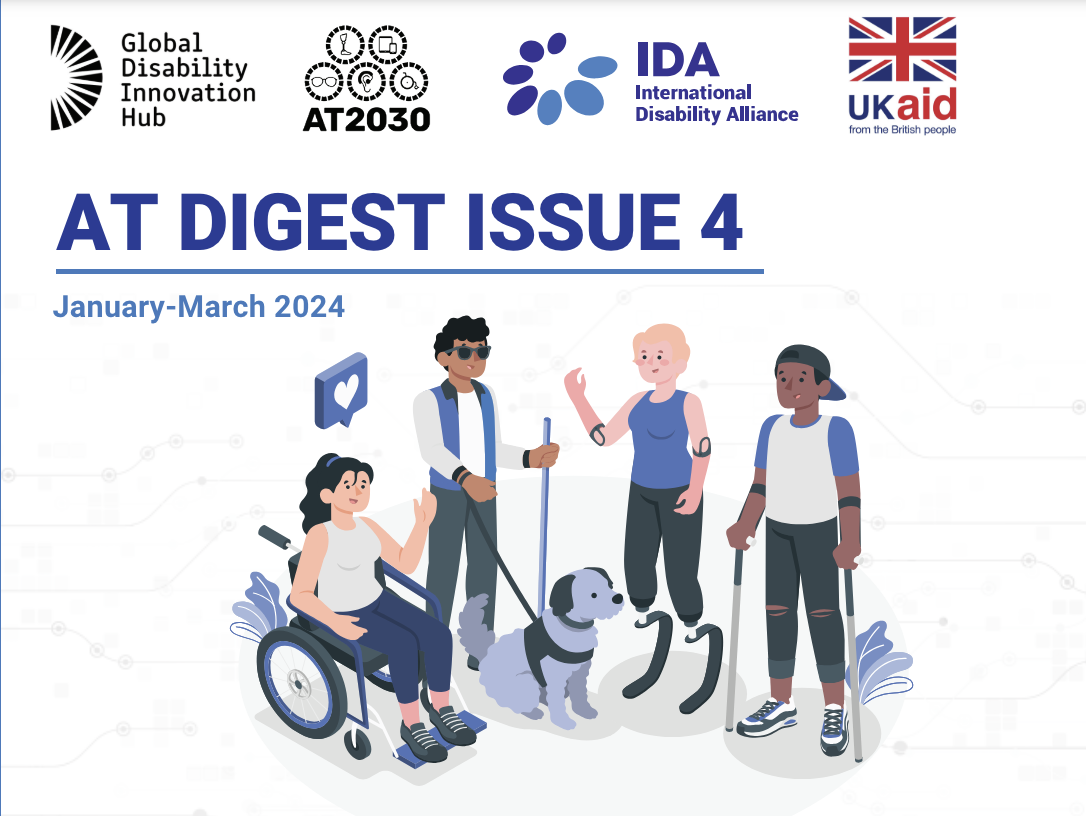
AT DIGEST ISSUE 4
International Disability AllianceMarch 18, 2024GlobalAT2030 ResourcesIn this fourth and final issue of AT Digest, IDA-GDI Hub Assistive Technology User Fellows reflect on the role of assistive technology in the inclusion and participation of persons with disabilities in public life. They penned this piece based on their personal experiences as well as data gathered from AT user interviews conducted in their respective countries namely: Bangladesh, Pakistan, Peru, Sudan, and Uganda. Five fellows interacted in pairs to design interview questions and interviewed 20 AT users representing different disability constituencies including persons with albinism, persons with intellectual disabilities and Deaf persons. IDA provided the Fellows with technical support and guidance notes.
-
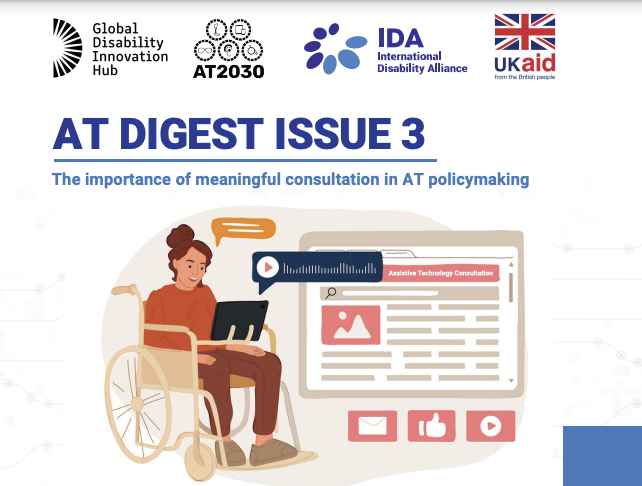
AT DIGEST: Issue 3
International Disability AllianceMarch 13, 2024GlobalAT2030 ResourcesThis third issue of the AT Digest reflects on focuses on the relevance of meaningful consultation with and participation of AT users, including organizations of persons with disabilities, to AT policy making and implementation processes.
-
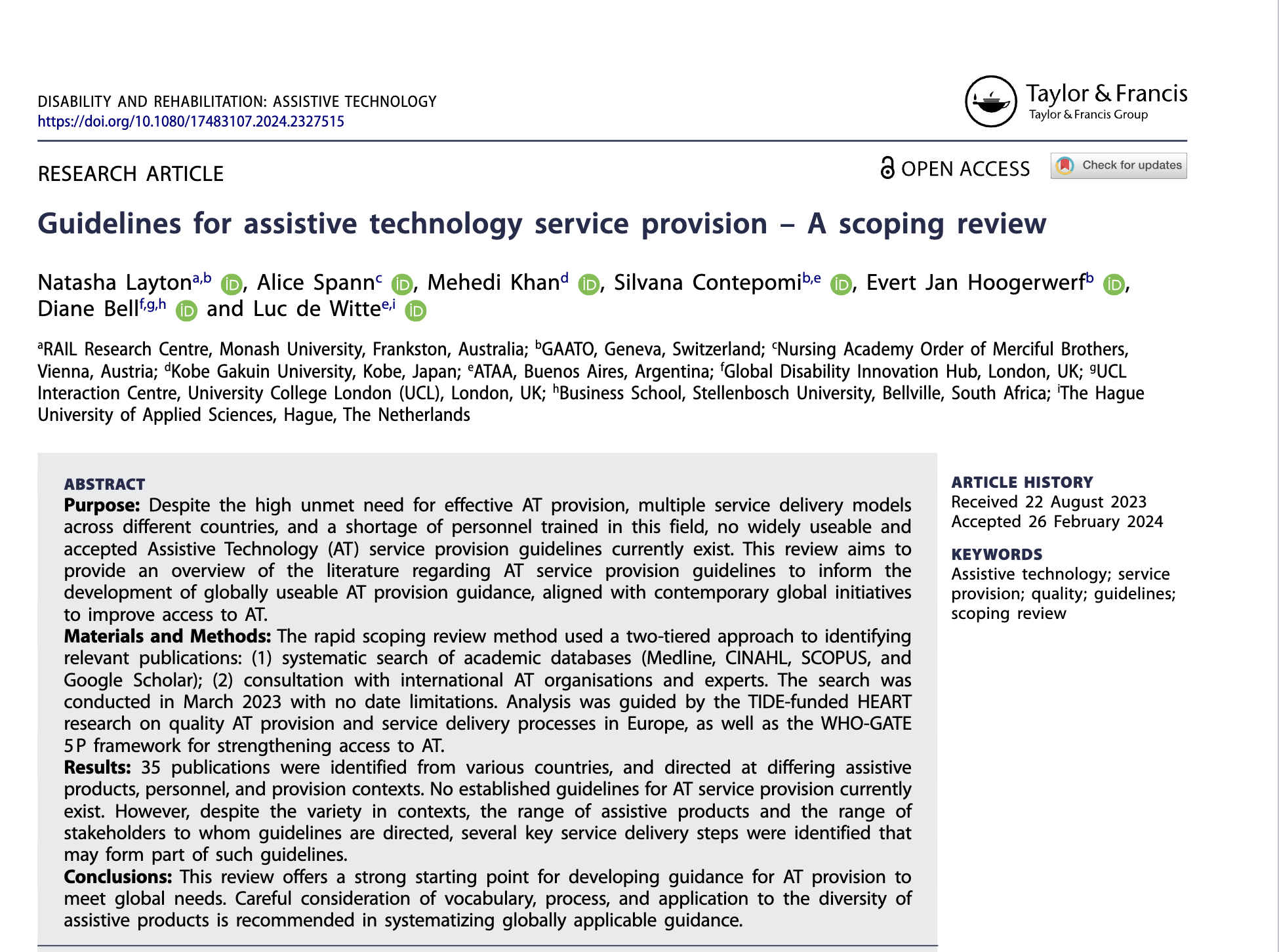
Guidelines for assistive technology service provision – A scoping review
Natasha Layton, Luc De Witte, Alice Spann, Evert Jan Hoogerwerf, Silvana Contepomi, Mehedi Khan Kobe, Diane BellMarch 12, 2024GlobalAcademic Research PublicationsDespite the high unmet need for effective AT provision, multiple service delivery models across different countries, and a shortage of personnel trained in this field, no widely useable and accepted Assistive Technology (AT) service provision guidelines currently exist. This review aims to provide an overview of the literature regarding AT service provision guidelines to inform the development of globally useable AT provision guidance, aligned with contemporary global initiatives to improve access to AT.
-
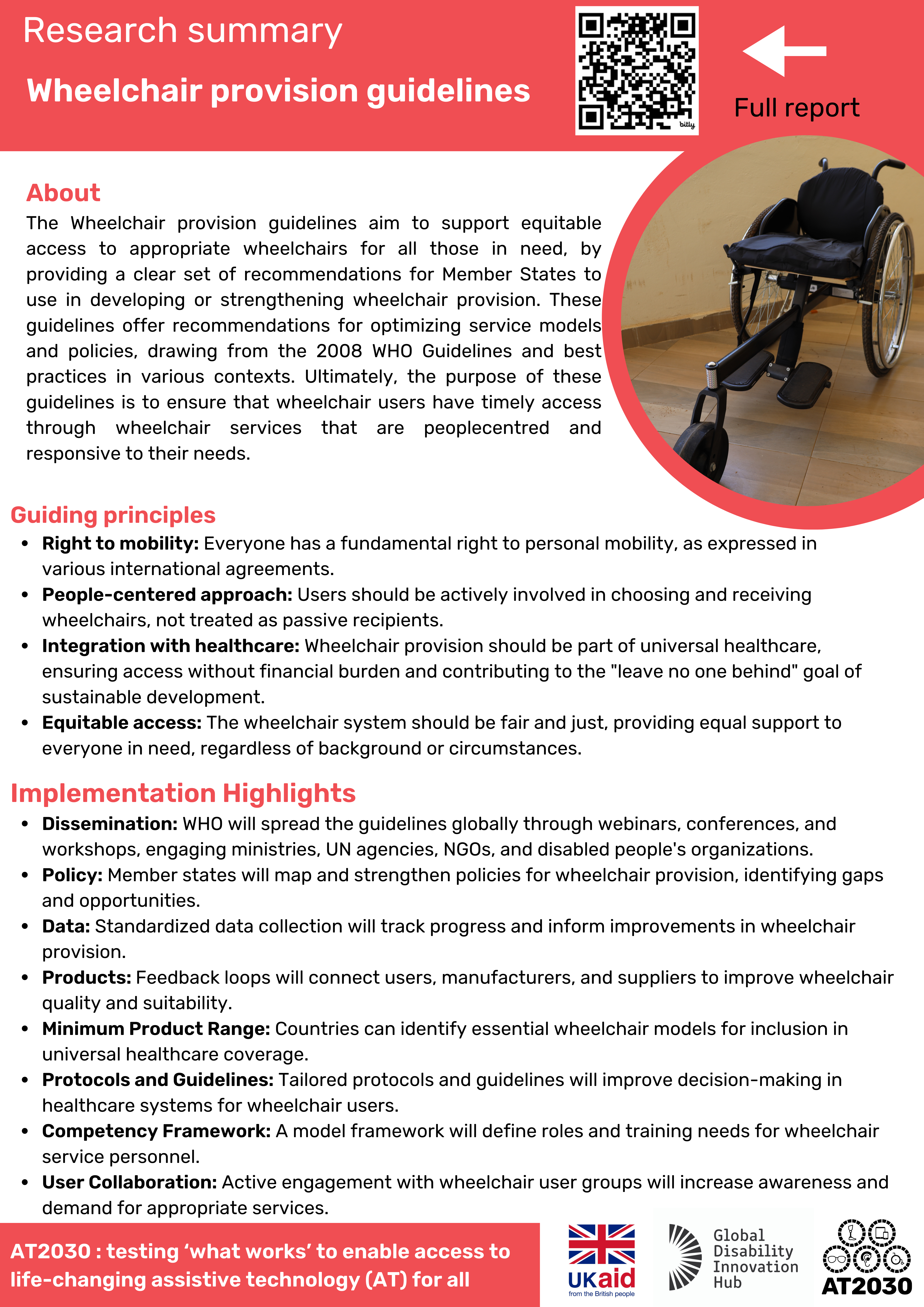
Research Summary: Wheelchair provision guidelines
World Health OrganizationFeb. 6, 2024GlobalResearch SummariesThis research summary provides key highlights and snapshot content from the wheelchair provision guidelines which aims to support improved access to appropriate wheelchairs, for all those in need, including children, older persons, people with mobility disabilities, and those with chronic health conditions.
-
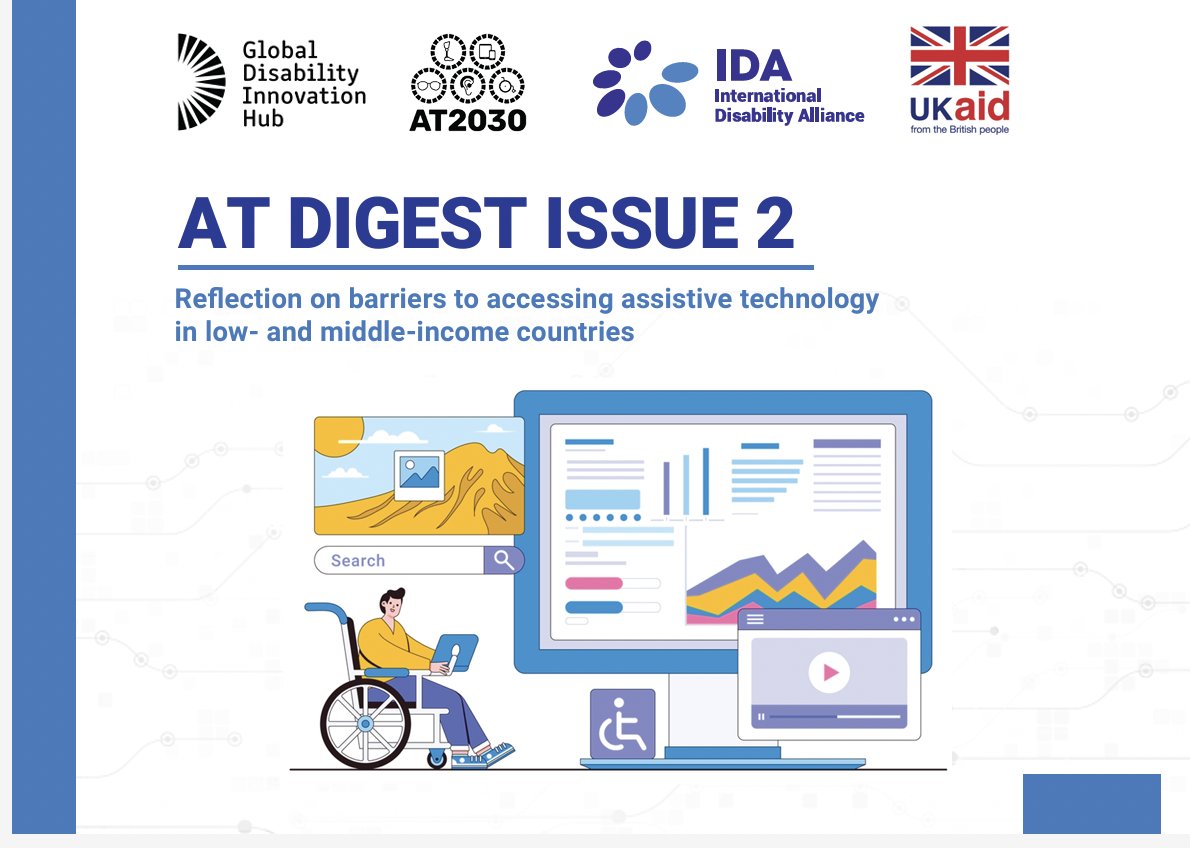
AT DIGEST Issue 2
Global Disability Innovation Hub, International Disability AllianceFeb. 1, 2024GlobalAT2030 ResourcesAT Digest is a quarterly publication curated by the International Disability Alliance with the objective of increasing awareness about the possibilities offered by assistive technology as experienced by its users. Additionally, it aims to disseminate information to a broad spectrum of assistive technology stakeholders, such as present and prospective users, manufacturers, and policymakers.
-
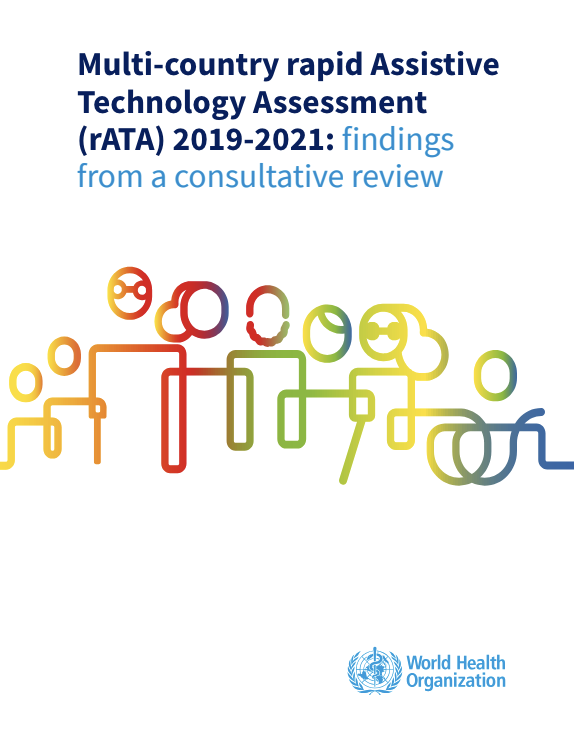
Multi-country rapid Assistive Technology Assessment (rATA) 2019-2021: findings from a consultative review
World Health OrganizationFeb. 1, 2024GlobalAT2030 ResourcesThis report documents a consultative review of the rapid Assistive Technology Assessment (rATA) survey and implementation. The review was carried out to inform the further development and use of the rATA survey, considering the methods used for data collection, country support, data analysis, and dissemination. The report provides lessons learned, recommendations, and actions to support and improve mechanisms for measuring access to assistive technology. The findings and recommendations are relevant for all stakeholders with an interest in measuring need and access to assistive technology.
-

It's a Much Harder Journey: Scaling Assistive Technology Innovations to New Markets in Africa
Global Disability Innovation HubJan. 30, 2024Academic Research PublicationsAccess to Assistive Technology (AT) in Africa is severely limited, with less than 25% of those who need AT have access to it. This paper examines three cases illustrating the journey of scaling AT innovations in African markets to enhance access. Our methodology involves within-case and across-case analyses, highlighting the significant impact of contextual factors on assistive product design and service delivery.
-
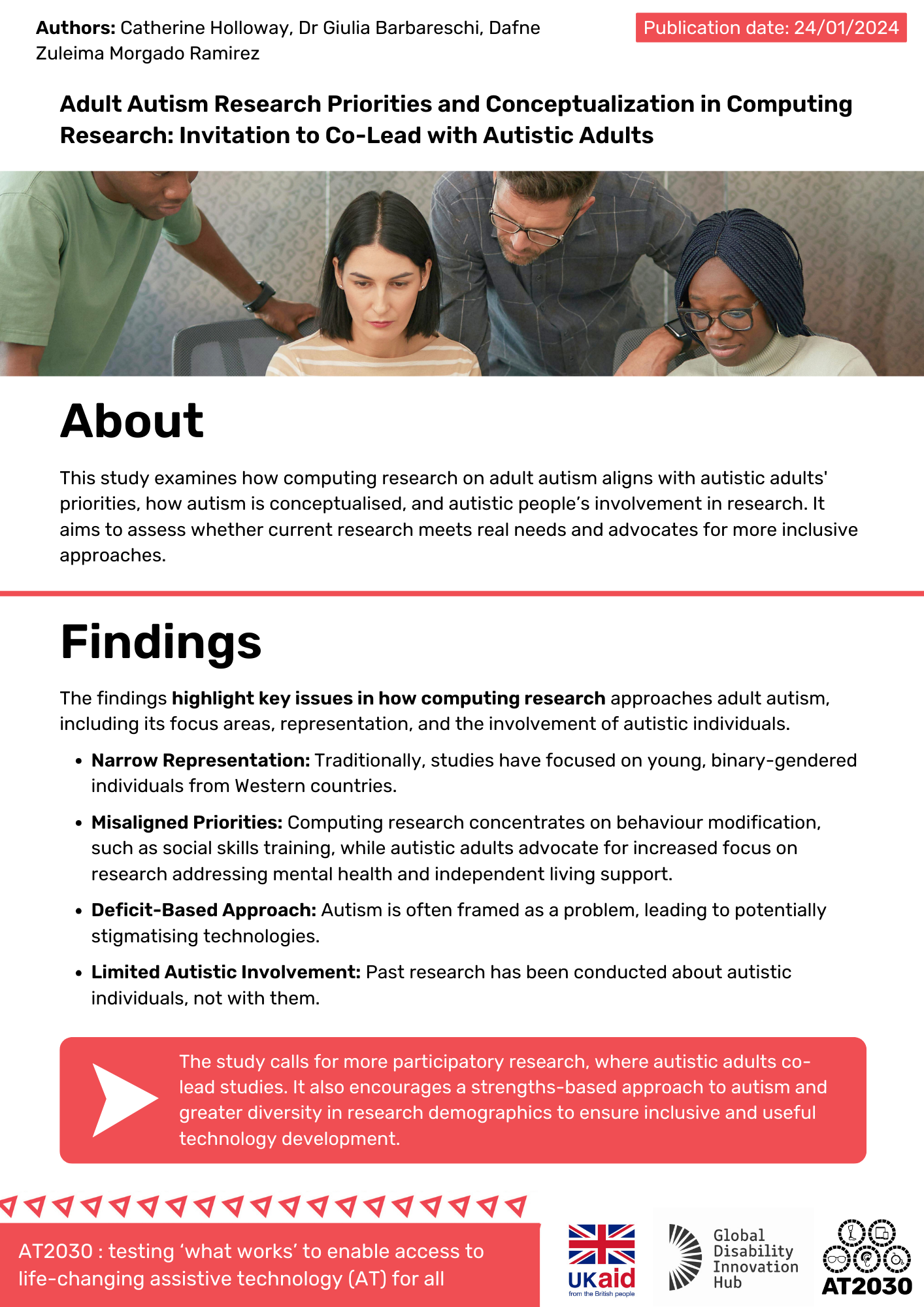
Adult Autism Research Priorities and Conceptualization in Computing Research: Invitation to Co-Lead with Autistic Adults: Research Summary
Catherine Holloway, Dr Giulia Barbareschi, Dafne Zuleima Morgado RamirezJan. 24, 2024Research SummariesThis study examines how computing research on adult autism aligns with the priorities of autistic adults, focusing on areas such as conceptualisation, representation, and involvement in research. It identifies key issues in the research process. The study advocates for more inclusive, participatory research with a strengths-based approach and greater diversity in research demographics.
-
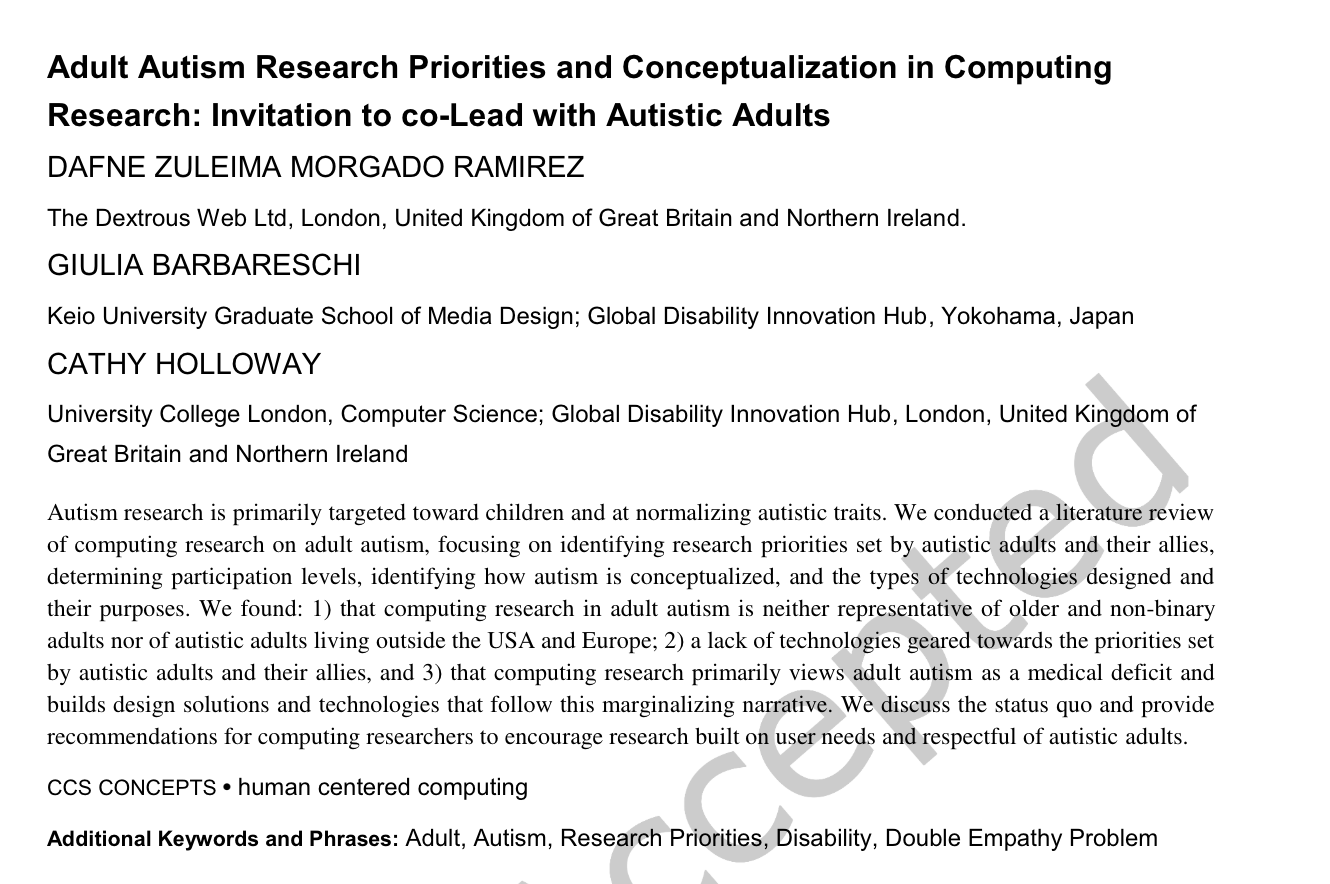
Adult Autism Research Priorities and Conceptualization in Computing Research: Invitation to Co-Lead with Autistic Adults
Catherine Holloway, Dr Giulia Barbareschi, Dafne Zuleima Morgado RamirezJan. 24, 2024GlobalAcademic Research PublicationsAutism research is primarily targeted toward children and at normalising autistic traits. We conducted a literature review of computing research on adult autism. We focused on identifying research priorities set by autistic adults and their allies, determining participation levels, identifying how autism is conceptualised, and the types of technologies designed and their purposes. This is important for future research as we need to ensure technologies designed for Autistic people are fully co-designed starting with the problem statement itself.
-
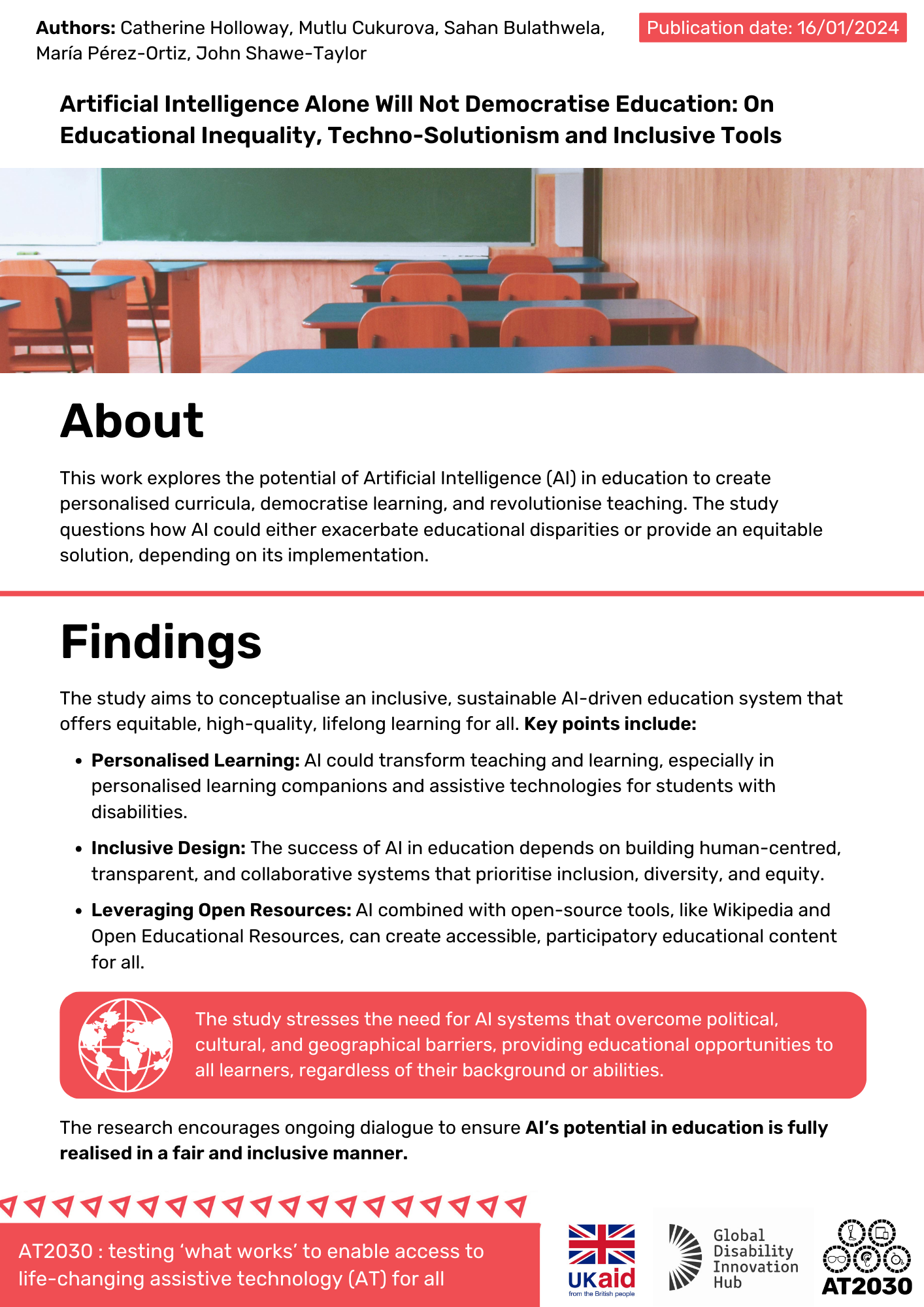
Artificial Intelligence Alone Will Not Democratise Education: On Educational Inequality, Techno-Solutionism and Inclusive Tools - Research Summary
Sahan Bulathwela, María Pérez-Ortiz, Catherine Holloway, Mutlu Cukurova, John Shawe-TaylorJan. 16, 2024Research SummariesThis work explores AI’s potential to personalise learning and improve access, highlighting its role in reducing or widening inequalities. It advocates for an inclusive AI system that supports lifelong learning, focusing on personalised learning, inclusive design, and open resources.
-
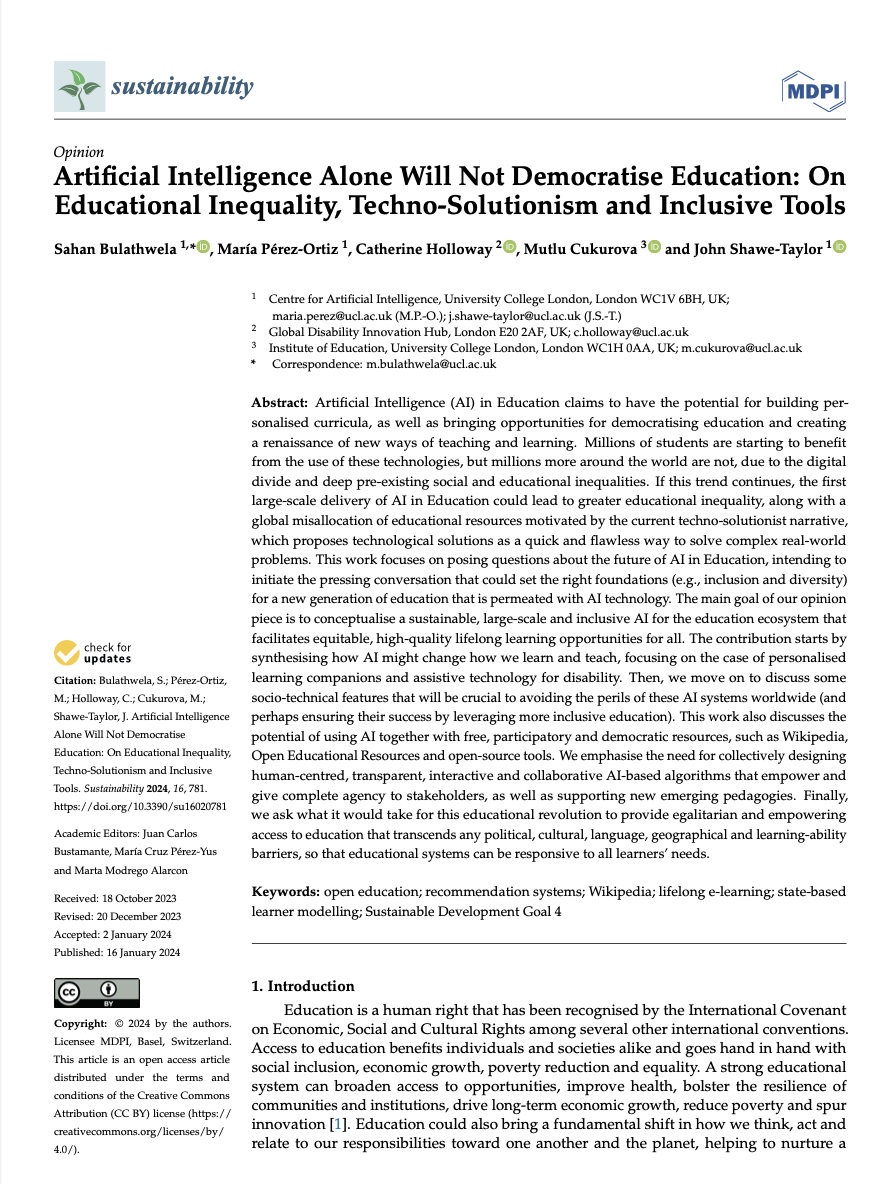
Artificial Intelligence Alone Will Not Democratise Education: On Educational Inequality, Techno-Solutionism and Inclusive Tools
Catherine Holloway, Mutlu Cukurova, Sahan Bulathwela, María Pérez-Ortiz, John Shawe-TaylorJan. 16, 2024Academic Research PublicationsThis piece explores AI's potential to personalise and democratise education while warning of risks like increased inequality due to the digital divide. It calls for an inclusive, equitable AI approach that prioritises human-centred design and open resources, aiming to create accessible, lifelong learning opportunities for all.
-
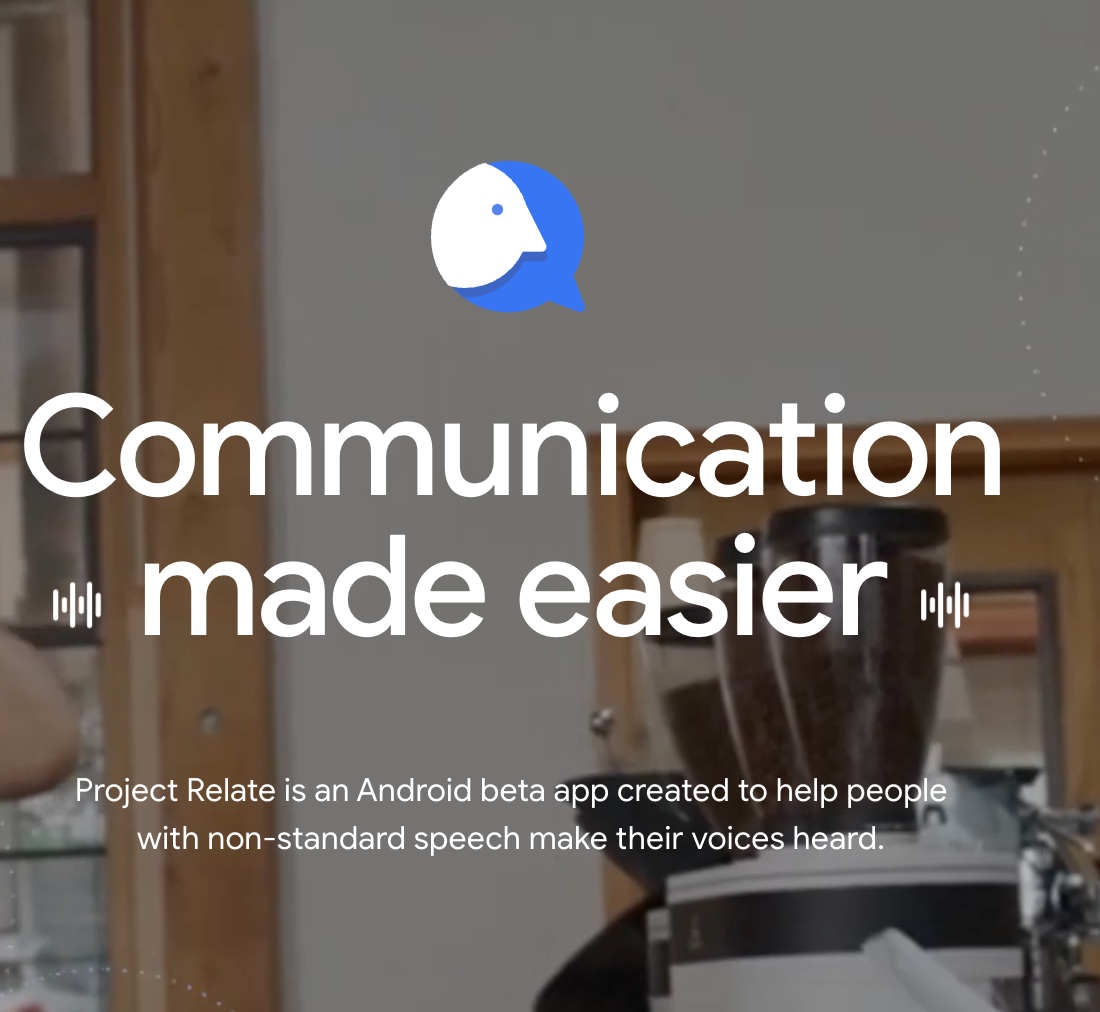
Project Relate Training
Global Disability Innovation HubDec. 31, 2023GlobalCase Studies and ReportsThis website provides training on Project Relate, a personalised speech recognition Andriod beta APP for people with non-standard speech.
-
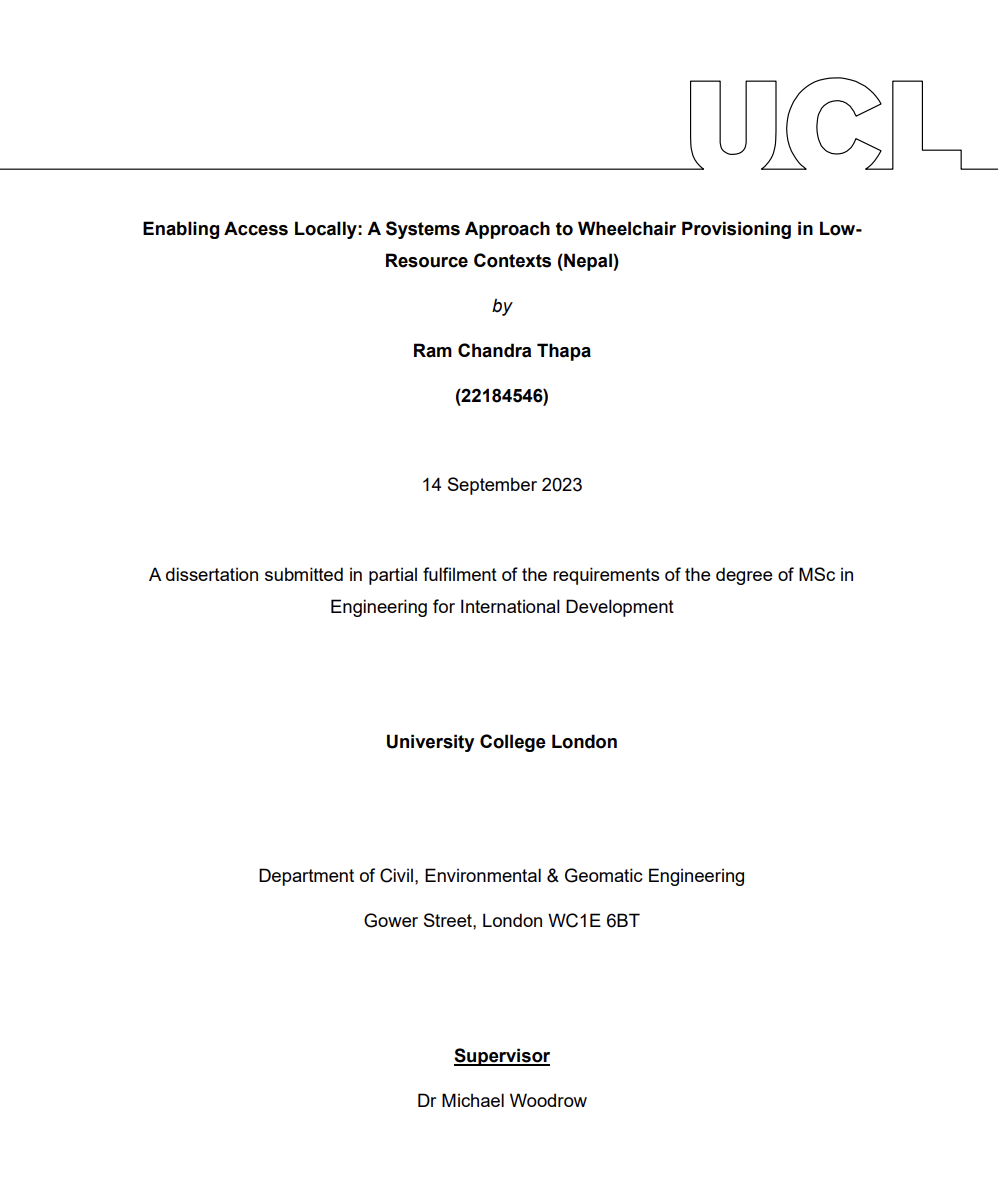
Enabling Access Locally: A Systems Approach to Wheelchair Provisioning in Low-Resource Contexts (Nepal)
RAM CHANDRA THAPADec. 19, 2023NepalAcademic Research PublicationsConsidering that 2.2% of Nepal's population faces disabilities, improving access to assistive technology is both a moral obligation and a priority for sustainable development. At the governmental level, efforts are underway to integrate essential assistive devices into the healthcare system aligning with WHO guidelines. However, there remain significant challenges in implementing these policies, despite constitutional guarantees of free and equitable access to assistive technology. This thesis proposes a collaborative approach to establish sustainable wheelchair provision in Nepal.
-
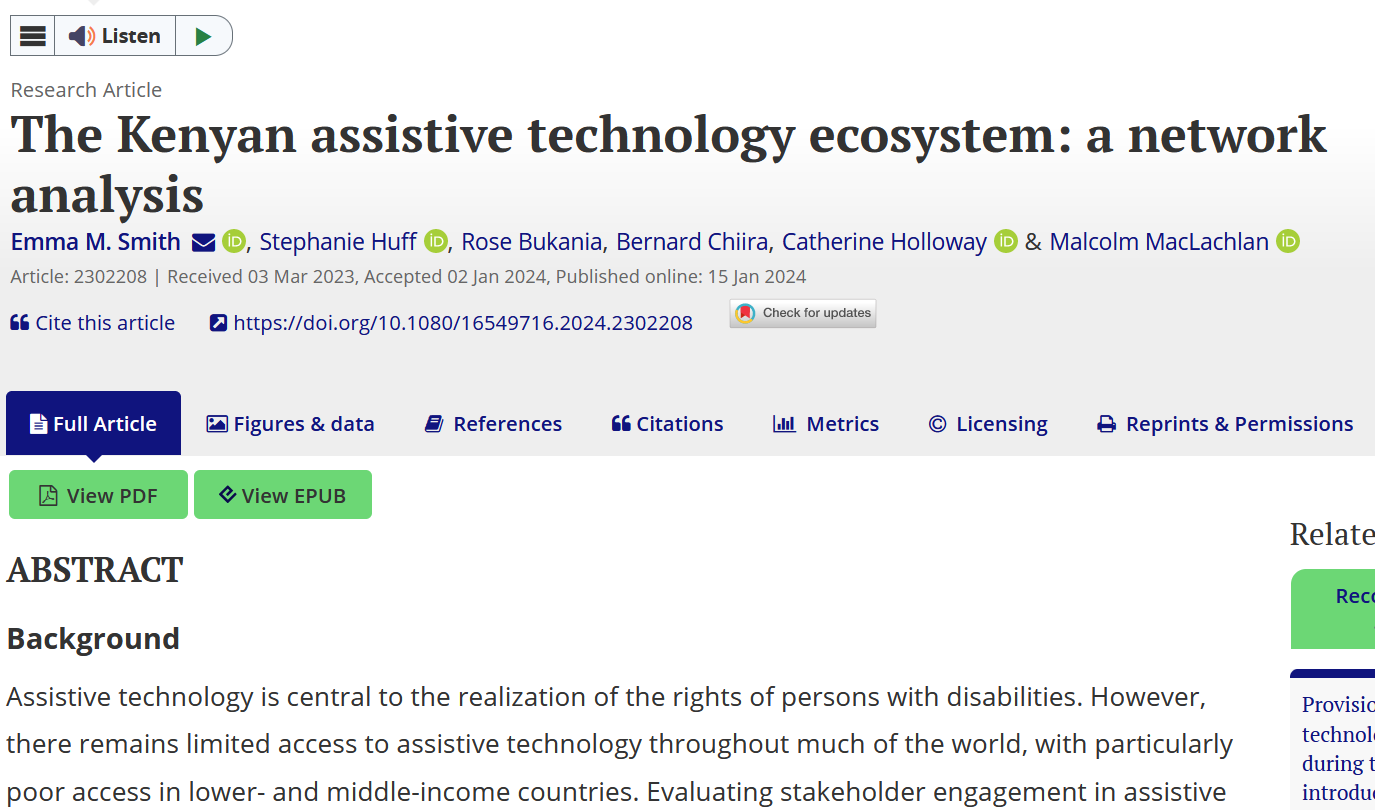
The Kenyan assistive technology ecosystem: a network analysis
Emma M. Smith, Catherine HollowayDec. 1, 2023KenyaAcademic Research PublicationsThe objective of this research was to provide an overview of the Kenyan Assistive Technology Ecosystem, including available assistive products and related services, and an understanding of the nature and strength of relationships between stakeholders. The research concluded that Improving access to assistive technology in Kenya will benefit from greater collaboration amongst all assistive technology stakeholders.
-
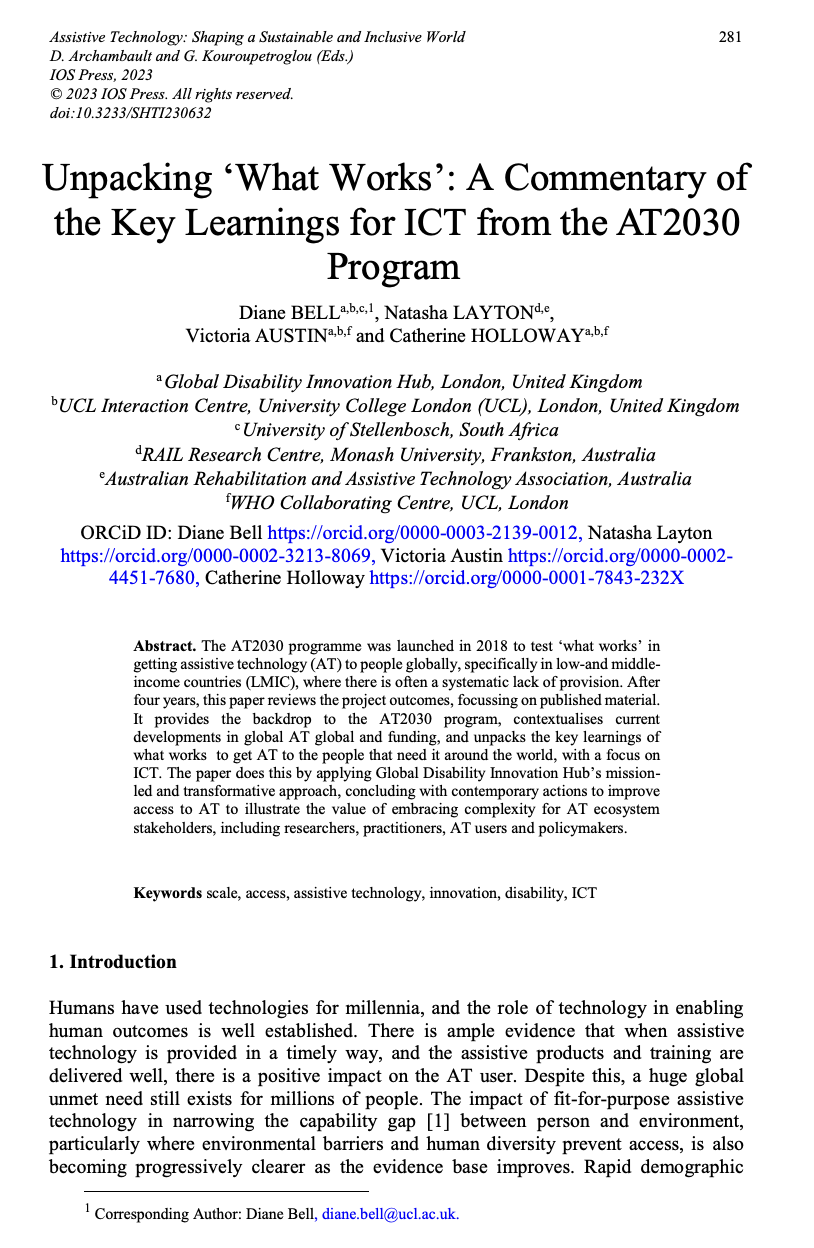
Unpacking ‘What Works’: A Commentary of the Key Learnings for ICT from the AT2030 Program
Catherine Holloway, Vicki Austin, Natasha Layton, Diane BellNov. 27, 2023GlobalAT2030 ResourcesThe AT2030 programme was launched in 2018 to test ‘what works’ in getting assistive technology (AT) to people globally, specifically in low- and middle-income countries (LMIC), where there is often a systematic lack of provision. After four years, this paper reviews the project outcomes, focussing on published material. It provides the backdrop to the AT2030 program, contextualises current developments in global AT global and funding, and unpacks the key learnings of what works to get AT to the people that need it around the world, with a focus on ICT.
-
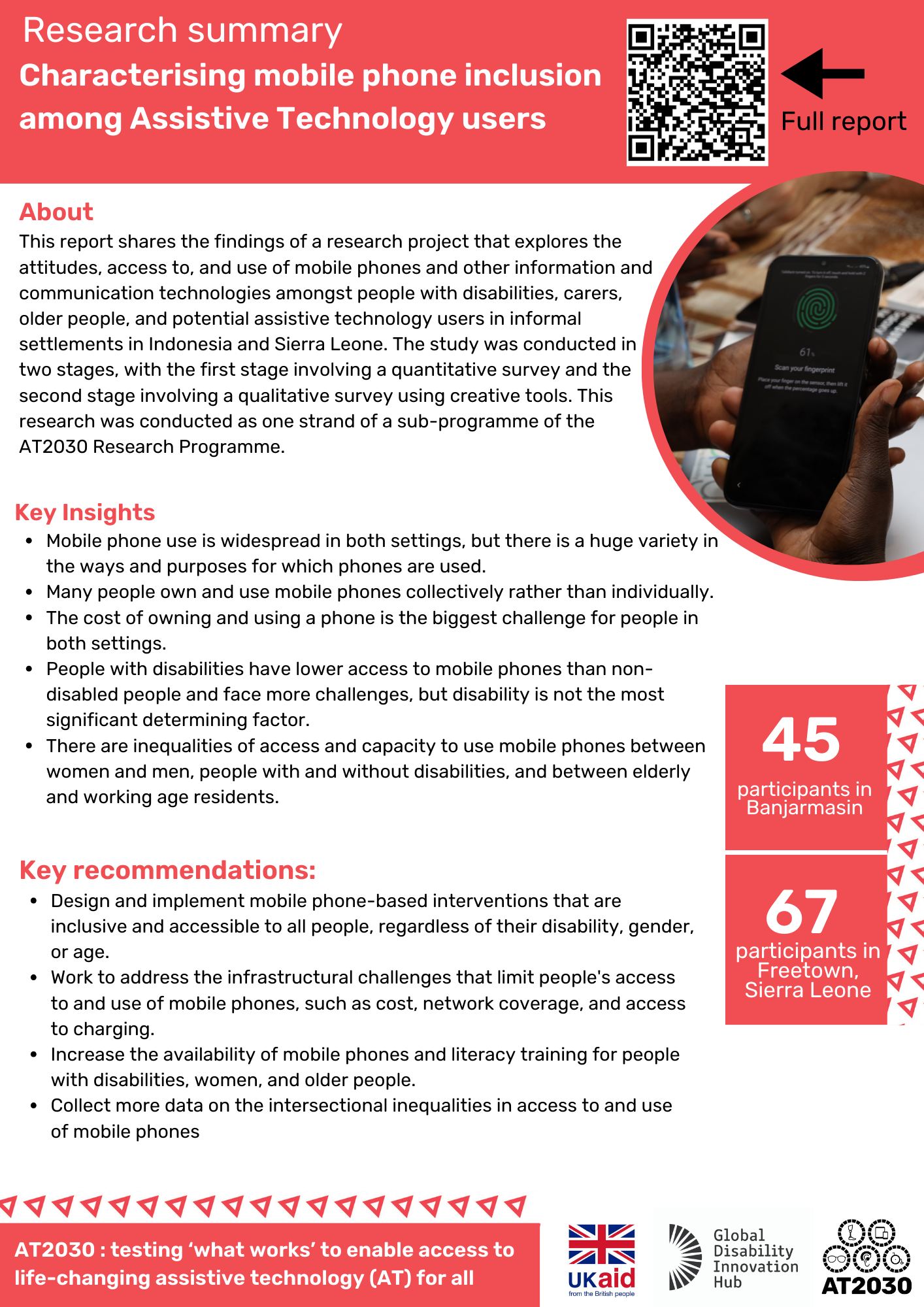
Characterising mobile phone inclusion among Assistive Technology users
Global Disability Innovation Hub, SLURCNov. 9, 2023Indonesia, Sierra LeoneResearch SummariesThis research summary provides key highlights and snapshot content from a major research study on the characterising mobile phone inclusion among Assistive technology users.
-
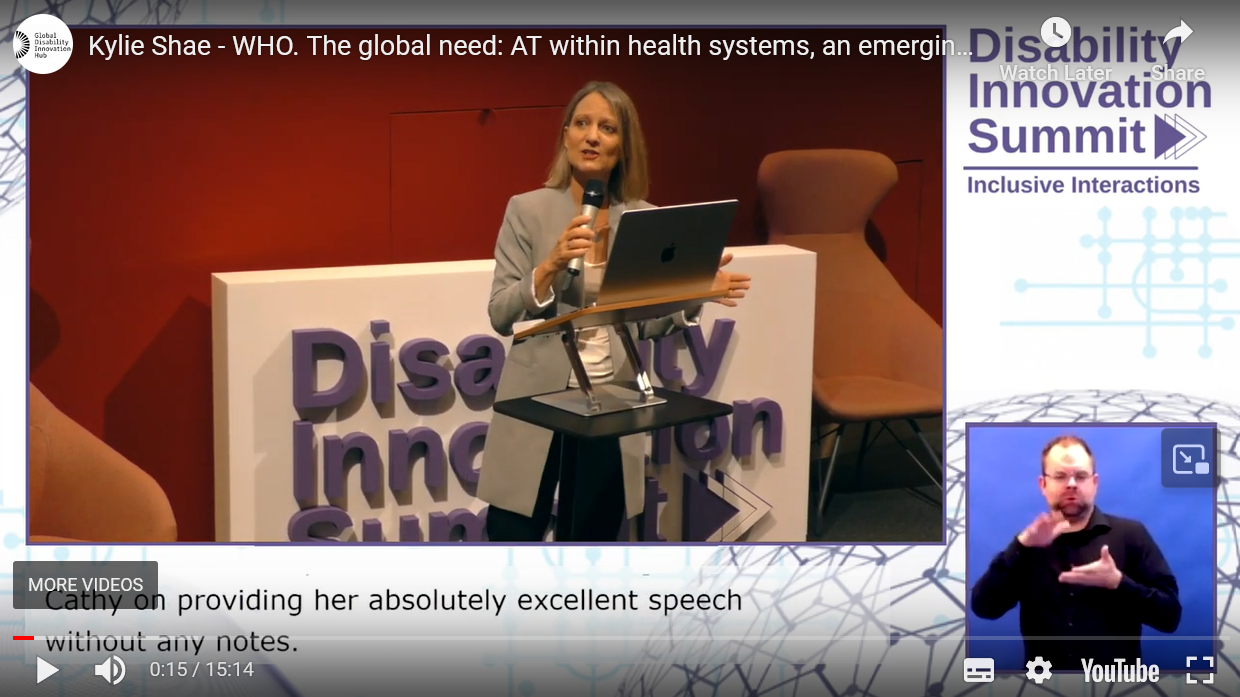
Disability Innovation Summit - Recordings
Global Disability Innovation HubNov. 1, 2023GlobalAT2030 ResourcesBringing together global experts and new voices to share big ideas and ask the question: What next for disability innovation? Catch up the summit recordings
-
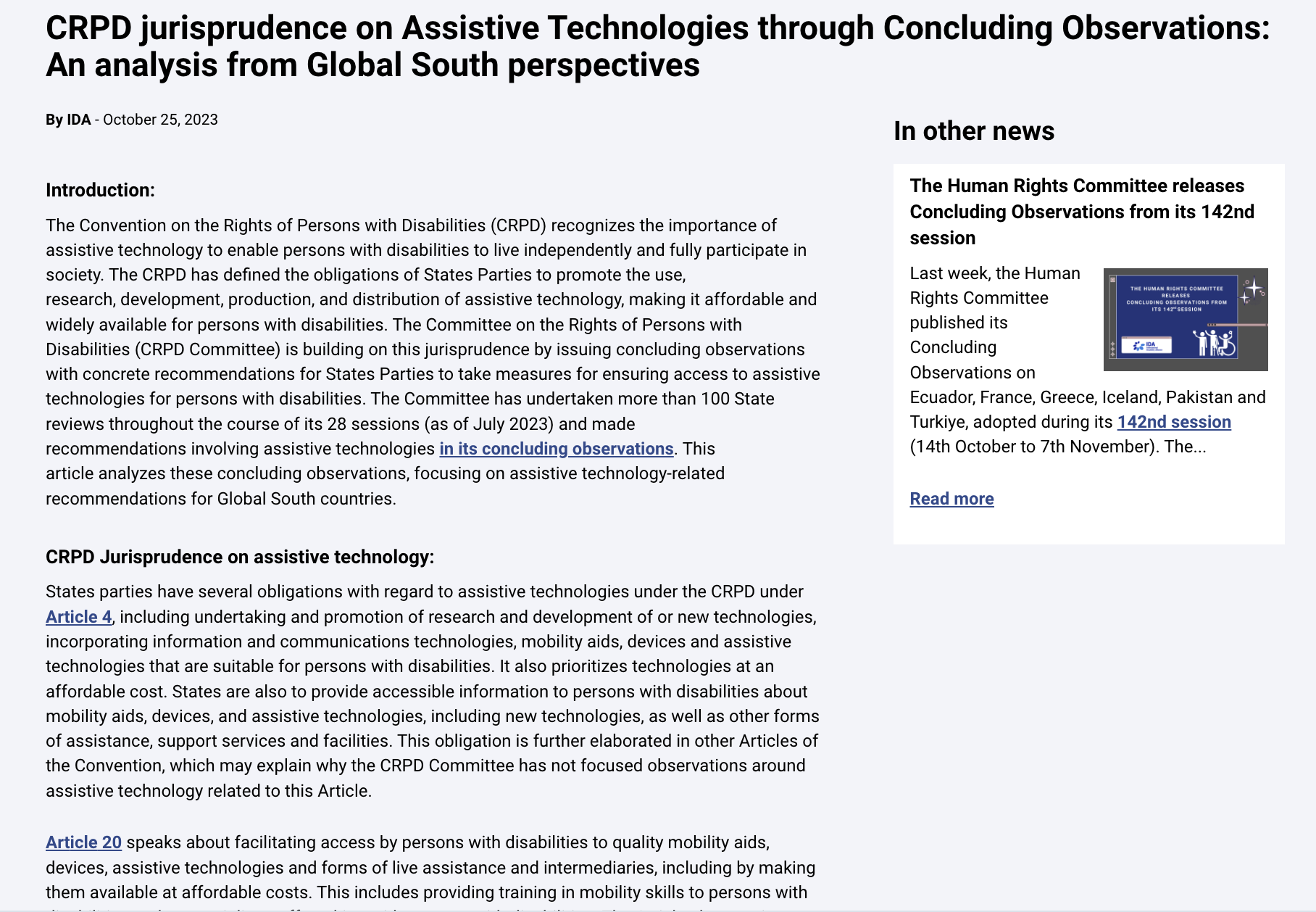
CRPD jurisprudence on Assistive Technologies through Concluding Observations: An analysis from Global South perspectives
International Disability AllianceOct. 25, 2023GlobalAT2030 ResourcesThe Convention on the Rights of Persons with Disabilities (CRPD) recognizes the importance of assistive technology to enable persons with disabilities to live independently and fully participate in society. The CRPD has defined the obligations of States Parties to promote the use, research, development, production, and distribution of assistive technology, making it affordable and widely available for persons with disabilities.
-
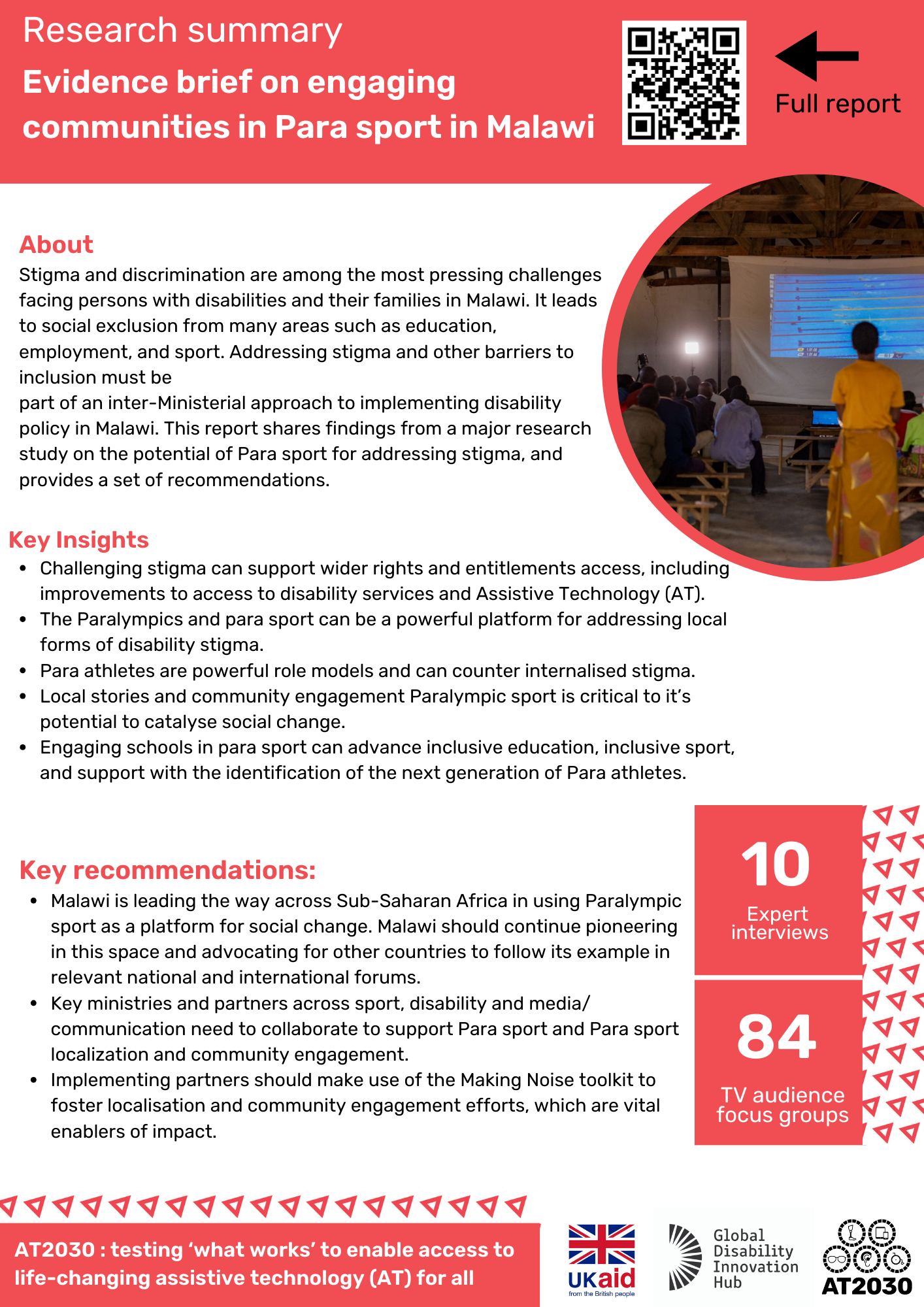
Evidence brief on engaging communities in Para sport in Malawi
Loughborough UniversityOct. 17, 2023MalawiResearch SummariesThis research summary provides key highlights and snapshot content from a major research study on the potential of Para sport for addressing stigma, and provides a set of recommendations.
-
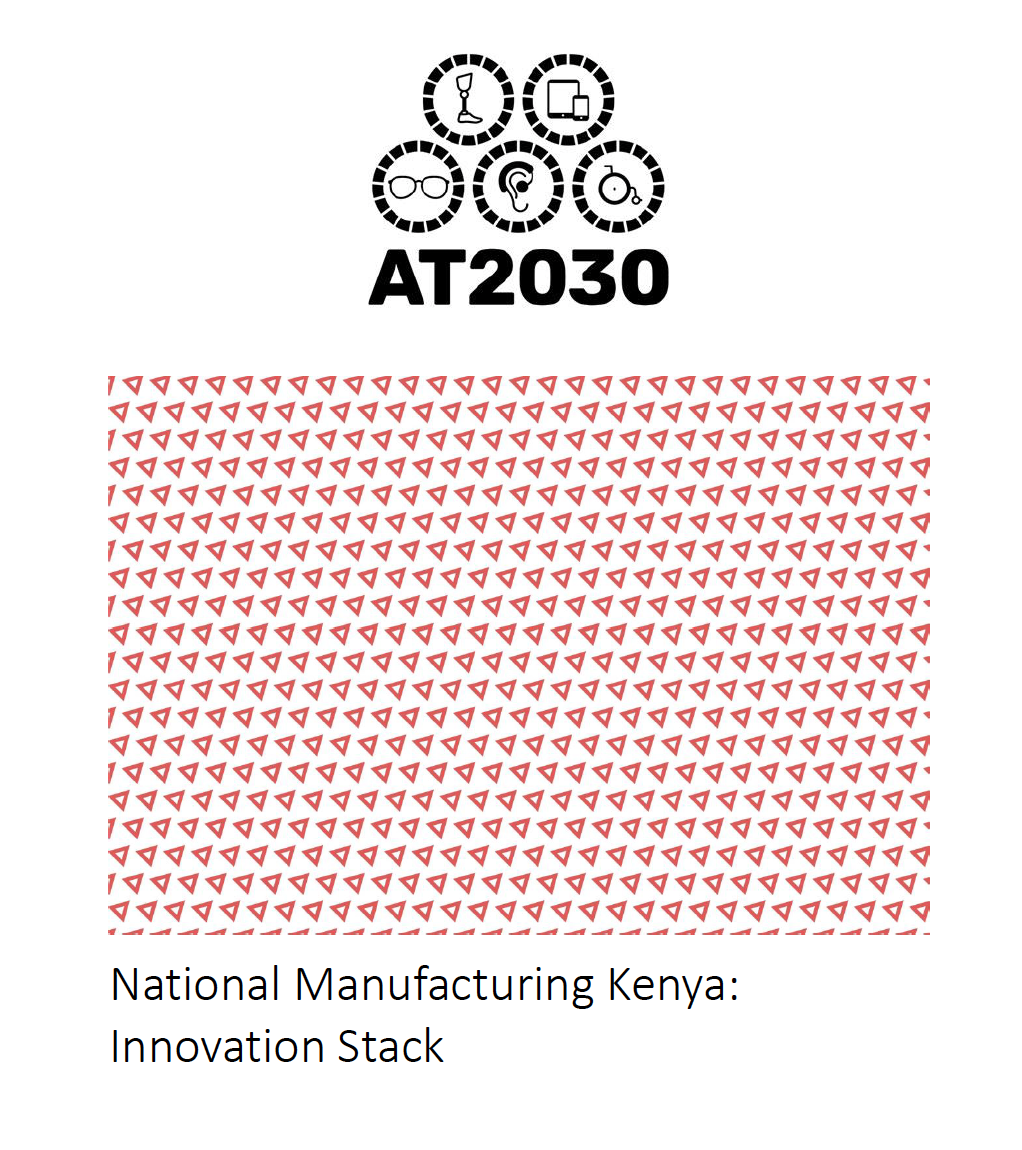
National Manufacturing Kenya: Innovation Stack
Global Disability Innovation HubOct. 4, 2023KenyaCase Studies and ReportsThis paper provides an overview of a model of local manufacture of wheelchairs by Motivation. Motivation is a disability inclusion charity and social enterprise, operational for 31 years. Their development of a Kenyan wheelchair manufacturing model will help to indicate whether national manufacture can provide one method of overcoming global supply challenges, inherent in a mass-market model, and aligns with the Kenyan Government's plans to boost the manufacturing sector and improve the provision of assistive technology, and the Government’s desire to be a regional provider.
Previous PageNext Page